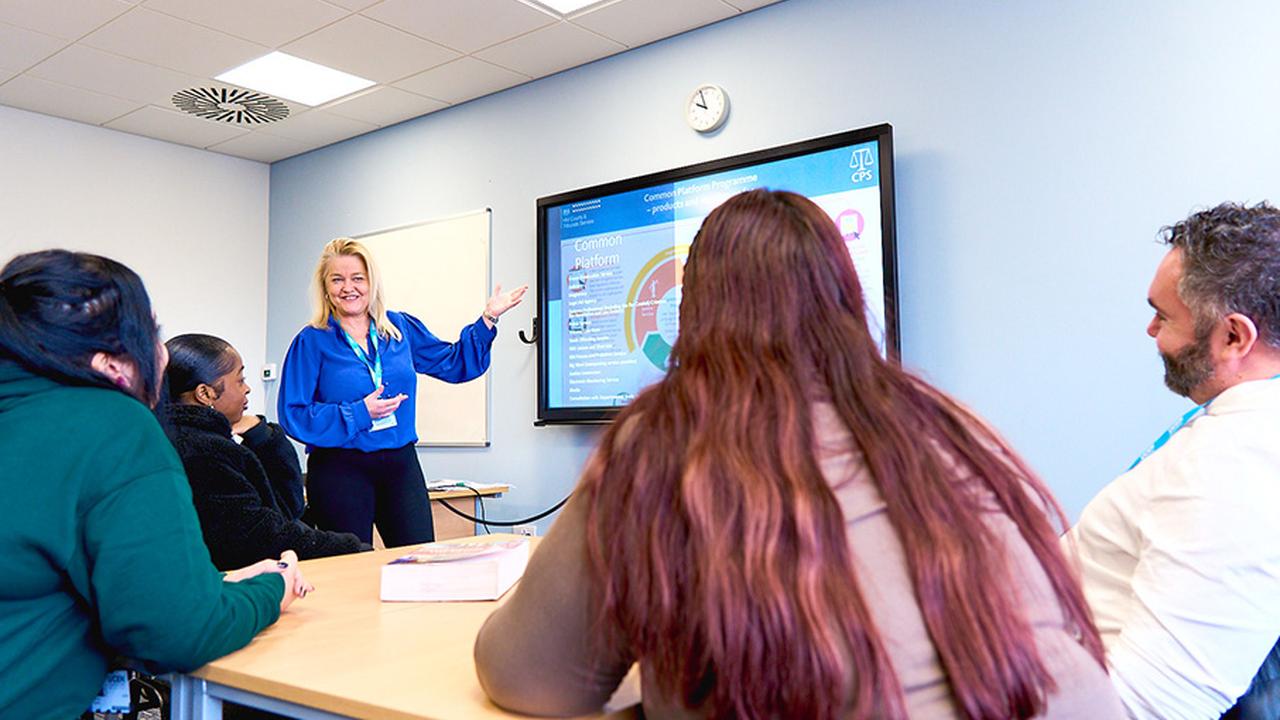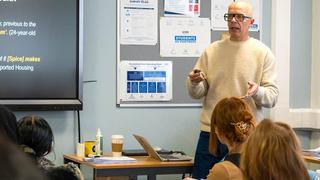Criminology and Criminal Justice Lecturer leads by example and pursues passion

Louise Kay, a Criminology and Criminal Justice Lecturer at UCEN Manchester, discusses her love for criminology and how this fascination with the subject influences her teaching and the experiences of the students on her courses.
Louise joined the teaching staff at the higher education provider in September 2022, after completing UCEN Manchester’s BA (Hons) Criminology and Criminal Justice course and attaining an MA in Applied Criminology from Manchester Metropolitan University.
One of the things that makes Louise’s story a little bit different is that when she enrolled at UCEN Manchester in 2018, she had been out of education for over 30 years. Louise left school without the confidence required to progress to further education and embarked on a career as an IT Engineer, later becoming a Service Manager for a supermarket.
The catalyst for Louise returning to education and giving university a try was a desire to demonstrate to her children that she practices what she preachers – she is an advocate of the importance of following your dreams and working hard.
In addition to teaching on the FdA and BA (Hons) courses at UCEN Manchester, Louise continues to maintain links with industry by supporting her local authority’s Youth Justice and Targeted Youth Support team.
To provide more of an insight into her journey, Louise recently took part in a short Q&A.
1. What sparked your interest in criminology?
In 1994, I was called for jury service, which gave me first-hand experience of criminal justice. This is when I became curious about the subject, but it wasn’t until later life that I had the confidence to pursue this interest and develop my passion.
Going to university as a mature student filled me with dread for numerous reasons, but the convenient location, small class sizes, personal support and free parking at UCEN Manchester helped me overcome these hurdles, and in all honesty, it’s the best decision I’ve ever made.
I now get up every morning and I can honestly tell people that I love my job. I, and the other lecturers that I work alongside, are truly passionate about criminology, but we also enjoy teaching and the fulfilment it brings.
I feel really fortunate that I had Angela Tobin, who is now a colleague, as my Lecturer. Her teaching style really inspired me to become a teacher and help others go on the same journey of exploration that I continue to enjoy.
2. How did you get involved with the work the local authority does and why do you continue to volunteer?
As part on my FdA studies at UCEN Manchester, I completed a Practical Based Research module, which encouraged me to obtain a volunteering position and put the theory I was learning in the classroom into practice. So, I got in touch with my local council and started working for them in 2019. It was a great decision as it also provided access to industry professionals, who later went on to contribute to my research projects.
In addition, volunteering provided valuable work experience, which was instrumental in me gaining paid employment with another local authority youth justice service and then adult probation in the community and custody.
That was why I started, but I continue volunteering for a number of reasons. Firstly, I live in the area and it’s one of the ways that I can give back to my community. The work I do also keeps my skill set relevant to the current needs of industry and I’m able to relay my experiences to the students that I teach.
Last, but by no means least, the relationships I’ve built over the four years I’ve been working with the council have even opened doors for numerous students that I’ve taught.
3. How does the volunteering work inform your teaching?
It provides a continuous channel for me to apply theory to practice and offers a first-hand insight into the complex challenges that young people face, and how these challenges are often a conduit to the criminal justice system.
It also reinforces the need to remain up to date with the latest legislation. For example, what offences are commonly committed by young people, and critically, why – this links back to my first point about the often chaotic nature of young peoples’ lives.
For someone as passionate about criminal justice as I am, it is interesting to get an insight into the direct impact of political policies on youth justice. Specifically, the work that is undertaken to reintegrate young people back into society and prevent reoffending after they’ve received a referral order.
For anyone that isn’t familiar with referral orders, by all intents and purposes they are a contract between a young person, the state and the community, with stipulations that are specific to the individual.
I’m able to talk to my students about how my volunteering work has opened up other opportunities and made me more employable. For example, my volunteering and subsequent paid roles gave me the chance to build relationships with a range of criminal justice practitioners.
Many of the contacts I’ve made now deliver guest lectures to current students as part of a new Vocational and Academic Development module. The speakers provide background about their role and the organisation they work for, and offer volunteering, work placement and internship opportunities to our students. Crucially, each of the organisations we work with are really focused on recruitment from within and many of their volunteers go on to secure paid employment.
4. What’s special about UCEN Manchester’s Criminology and Criminal Justice courses?
The different teaching style is what really stands out to me. We don’t teach in lecturer theatres - our classes are typically no bigger than 15 students and take place in classrooms that facilitate conversation. This more intimate approach also cultivates friendships and peer groups, which can prove extremely valuable, particularly during assessment periods when support is critical.
Each of our students is allocated a Personal Tutor, who will build and maintain a relationship with their students throughout their FdA or BA (Hons) course. They also get as much one-to-one time as they require to support their learning needs. The amount of time and level of support that each of our students requires is different, and being able to meet these varying needs is one of the reasons why I believe our offer stands out from the crowd.
In addition, and as I’ve discussed, myself and the other Criminology and Criminal Justice Lecturers at UCEN Manchester continue to work in industry and maintain links that ultimately benefit our students.
Find out more about the Criminology courses available at UCEN Manchester and apply now.
Alternatively, get in touch via 03333 222 777 or online.

